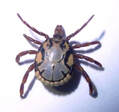|
Most animals can produce their own vitamin C with the exception of fish, primates (including humans) and guinea pigs.
Lady bugs and their larvae are valued insects. They feed on aphids that destroy plants by sucking out juices and transmitting diseases. Corn on the cob is best served the day you buy it; don’t refrigerate. Look for bright-green husks wrapped tightly around the ear, with flowing moist silk (not brown). Pull back husk; kernels should be small, shiny, firm, and tightly packed. The Bull Thistle is the national emblem of Scotland. Legend says that when the Danes invaded Scotland, they removed their boots to move quietly. A soldier stepped on a thistle and yelled, which alerted the Scots of the attack. A superstition was thus born that anyone who wore a thistle was immune to danger. Don’t be alarmed by June drop of tree fruit. It is a natural thinning process. Thin remaining fruit six to eight inches apart, if necessary, or prop heavy branches to avoid breakage. Pinch shoot tips of impatiens, chrysanthemums, petunias and coleus to promote better growth. Wait to plant pumpkins until the Fourth of July to avoid egg-laying season for pumpkin-munching pests. If you are bitten by a tick, watch for the telltale signs of Lyme disease: a rash that spreads usually starting a few days after you were bitten; fever, chills, and muscle aches; extreme fatigue; and neck stiffness that can set in quickly or a week later. Despite lowering your stress level, walking in the rain offers the following benefits: the smell of the rain refreshes the mind; high humidity keeps the skin and hair moisturized; it is said that physical activity done in the rain burns more calories and fats than when done on a good day; while raining, droplets absorb dust and microbes, so the air is purified and cleaner; walking in the rain makes one feel rebellious; helps you see problems from another perspective; fewer people go out in the rain so have a better sense of space, so our thoughts and emotions can roam free, and run wild! Gardeners should have a tetanus/diphtheria vaccination every 10 years because they are at a higher risk of tetanus infections.
0 Comments
Leave a Reply. |
AuthorsCurrent and former staff members have contributed to our newsletter over the years. Now the articles are available to view here on our blog Categories
All
|
© 2024 Ski Landscape Corporation - Website by Day Design






 RSS Feed
RSS Feed